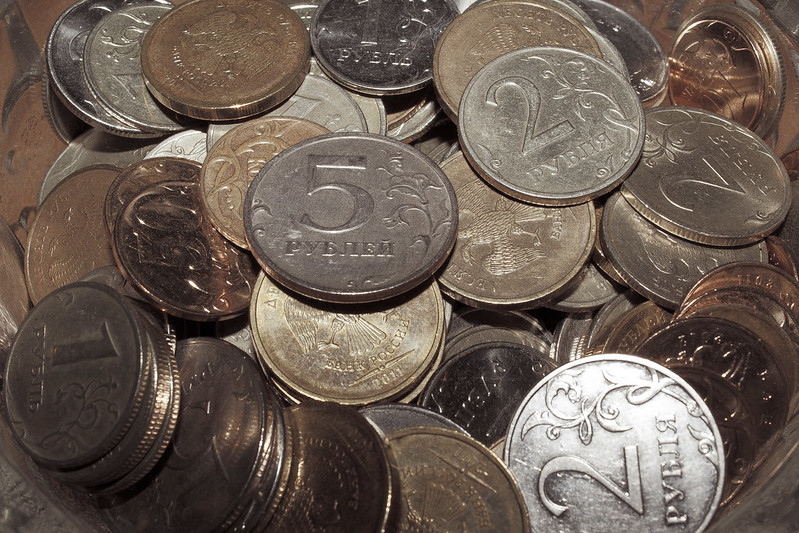Russias economy in Putin's fifth term
Moscow will soon introduce new tax burdens to support the war effort, with the risk also of drastic interventions on bank savings. And as the rouble continues to devalue, the use of gold as a safe haven asset grows.
Moscow (AsiaNews) - The scenario that opens after Putin's re-election and the prospects of a new escalation of the war in Ukraine (and perhaps on other fronts) is complicated by the difficult prospects of the Russian economy in the face of the more incisive effects of Western sanctions, which will soon decide what to do with the assets of the Central Bank of Russia abroad. This is one of the decisive battles of the ongoing war, to be fought not with bombs, but with financial strategies. The Russian economist Andrej Jakovlev commented on these Russian emergencies on Grani.Vremeni, warning that "now is the time to save your savings".
The first observation concerns the death of Alexei Naval'nyj and the subsequent consecration of Vladimir Putin as president of Russia, stating that "there is nothing unexpected in these events, there was not much hope and now there are even fewer illusions that everything can return to normal." We return to Stalin's dictum, when it was said that "enemies must be liquidated wherever they are", a few days before the assassination of Leon Trotsky in Mexico.
Beyond the conditions of terror and repression, according to Jakovlev, "the longer the war continues, the less money is left in your pocket". The government will soon introduce new tax burdens, reaching a 20% tax burden for a considerable part of the population, something never seen before. The economist explains that "the power is breaking the agreement with the middle class of the big cities and the upper classes of Russian society, to try to channel all economic capabilities into the war". Putin's re-election, beyond many superficial declarations, serves to relaunch the country's efforts in the conflict with Ukraine and the West.
Anyone who earns more than 100 thousand rubles a month (one thousand euros) will be increasingly harassed for supporting the war, and this is the entire Russian "middle class", starting with doctors and teachers, and it certainly does not concern the great oligarchs, for whom very little will change. Jakovlev states that "the war for Putin is much more important than the lives of Russians", and we will return to the convulsive phases of the first years of post-communism, when many workers received their salaries in irregular and particularly limited ways.
The risk is that all Russian bank savings for war emergencies will be frozen. Financial systems today work differently than in times past, and it is easier for the state to control accounts and obligations. There are trillions of rubles in deposits, especially those of companies, rather than of individual citizens, which "remain in play in the financial merry-go-round", and the Kremlin is reaching out to them.
Many tried to save their money by accumulating cash, but the continuous devaluation of the ruble causes increasingly significant losses, and even purchasing real estate at this time is decidedly not convenient, both in Russia itself and in the occupied territories of Russia. 'Ukraine, where large lands and properties can be purchased with little money, whose fate is entrusted to the unpredictable winds of the great local and global conflict.
The course of the ruble varies from month to month in a downward curve that appears unstoppable, and since the beginning of the war many have begun to buy gold, which today represents the safe haven for Russians trying to save their accumulated capital, given the difficulty of exchanging rubles into hard currencies, and not just into Chinese yuan.
If a Russian today wants to leave the country and sell his properties, and then buy something in the West in dollars or euros, he must try to transfer his assets to other "friendly" countries, from which he can then reach his destination with complex itineraries, supported by collateral in gold or other protected assets. Some try to settle abroad and then return to Russia if the schemes do not hold up, as happened to the bankers Friedman and Aven.
Jakovlev's conclusion is that "the Russian economy is moving on prospects of returning to Soviet-style state control, not immediately, but within two or three years", and this will be the characteristic of Putin's new mandate for the lives of Russian citizens, even more than "military special operations" and mobilizations at the front. Those who have accumulated capital in past years will have to invent increasingly alternative paths to escape the voracity of Tsar Putin V's wartime state.
Photo: Flickr / /Alexandr Samoyluk







.png)










